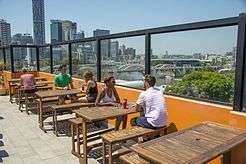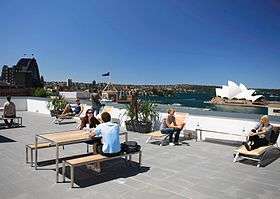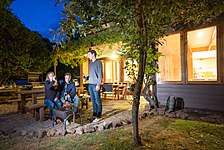YHA Australia
 | |
| Abbreviation | YHA |
|---|---|
| Formation | 1939 |
| Legal status | Not-for-profit, membership-based organisation |
| Purpose | Budget accommodation network across Australia |
| Location | |
Region served | Australia |
| Affiliations | Hostelling International |
| Website | YHA Australia |
YHA Australia is a youth hostelling association in Australia that is a member association of Hostelling International, the world's largest budget accommodation network with over 4,000 hostels in more than 90 countries. YHA has a network of more than 80 hostels located in every state and territory across Australia, ranging from large urban properties to small eco-hostels in the bush, making YHA the largest provider of backpacker accommodation in the country. YHA Australia is a membership-based, not for profit association, with all profits going back into the hostels and the experience they provide.
History

Youth hostelling in Australia started in 1939 when YHA Victoria was formed in Melbourne, followed by YHA New South Wales (1942), YHA South Australia (1949), YHA Tasmania (1951), YHA Western Australia (1951), YHA Queensland (1962) and YHA Northern Territory (1976).[1]
In 1947, the state organisations formed YHA Australia as a federated body to allow Australia to be represented in the International Youth Hostelling Federation (the original name for Hostelling International).[2]
Over the last decade, a series of mergers have consolidated the state bodies into one national organisation. New South Wales, which already covered the Australian Capital Territory, and the Northern Territory merged in 2007, before the merger of YHA NSW and YHA Queensland completed on 1 January 2010 formed a new entity called YHA Ltd. YHA Victoria merged into YHA Ltd in 2012, followed by YHA South Australia in 2014, YHA Tasmania on 1 January 2017, and finally YHA Western Australia on 1 September 2017, completing YHA's 10-year journey towards becoming one national entity in Australia.[2]
The former national body, Hostelling International Australia, also merged into YHA Ltd in 2016.[2]
Mission statement and logo
The YHA Ltd Mission Statement is: "To provide opportunity for all, but especially young people for education by personal development, fostering friendship and bringing about a better understanding of others and the world around them".
The YHA 'house and tree' symbol originates from the first Hostelling International signs in Europe in 1934. The three messages used in the green Australian logo are the tree representing the environment, the house representing shelter and the open door representing just that, a welcoming open door.
.jpg)
Heritage hostels
As a not-for-profit organisation, every dollar YHA earns is re-invested in the network of hostels – and that often means converting historic properties into modern accommodation. Fremantle Prison YHA is located in the women's wing of a World Heritage-listed 19th Century prison. Railway Square YHA is situated on the disused 'Platform Zero' of Sydney's Central Station, with replica rail carriages providing multi-share rooms and the old parcels sorting shed re-purposed into the hostel's main building. Newcastle Beach YHA is a converted 'gentleman's club' founded in 1885, and Blue Mountains YHA is a well preserved art deco building that used to be the home of the Wentworth Cabaret, featuring the oldest sprung timber dance floor in the Southern Hemisphere.[3]
Awards and sustainability

Sydney Central YHA[4] and Sydney Harbour YHA[5] have won the acclaimed national 'Best Backpacker Accommodation' Award at the Australian Tourism Awards. Adelaide Central YHA has won 'Best Backpacker Accommodation' in South Australia; Alice Springs YHA has won 'Best Backpacker Accommodation' in the Northern Territory; Brisbane City YHA and Cairns Central YHA have won 'Best Backpacker Accommodation' in Queensland; Melbourne Metro YHA has won 'Best Backpacker Accommodation' in Victoria; Perth City YHA has won 'Best Backpacker Accommodation' in Western Australia, and Thredbo YHA has won 'Best Backpacker Accommodation' in the Canberra & Capital Region awards.

YHA Australia is committed to reducing its impact on the environment and raising awareness of the benefits of low-impact travel. YHA's Sustainable Hostels Fund – which encourages guests to donate $1 when they book a stay online that YHA then matches dollar for dollar – has helped install solar hot water systems at Adelaide Central, Perth City, Byron Bay, Cairns Central, Glebe Point, Pittwater, Grampians Eco Lodge and Melbourne Metro, as well as solar power in Alice Springs, which generates as much as half of that hostel’s energy needs. The 145 solar cells installed on Perth City’s rooftop in 2014 saves more than 42 tonnes of carbon emissions a year.[6]
In 2016, Sydney Harbour YHA installed a 30kW photovoltaic solar system to help power the hostel, 50% bankrolled by the Sustainable Hostels Fund. The solar panels saved almost four tonnes of carbon missions within a month of being switched on in October. Railway Square YHA followed suit in 2017, installing a 62kW solar PV system and a solar-boosted hot water system.[7]
YHA-owned hostels also stopped selling disposable water bottles in 2014, instead encouraging guests to purchase refillable bottles sold at reception for cost price. Many YHA hostels also feature rainwater tanks, on-site vegetable gardens and composters, bike rental, swap shelves, low-energy lightbulbs/LEDs, and water-saving bathroom devices to promote sustainable travel.[6][8][9][10][11][12][13][14][15]
References
- ↑ John McCulloch (May 1992). "The Youth Hostels Association: Precursors and contemporary achievements" (pdf). The Journal of Tourism Studies. Australia: James Cook University. 3 (1): 22–27. Retrieved 2009-04-04.
- 1 2 3 "YHA Australia Hostels - YHA Australia". www.yha.com.au. Retrieved 2016-12-29.
- ↑ "The past lives of YHA hostels | YHA Australia". www.yha.com.au. Retrieved 2017-07-03.
- ↑ "Australian Tourism Awards 2011". Archived from the original on 2011-07-19. Retrieved 2012-12-05.
- ↑ Kate Schneider (2012-03-03). "Australia's best named in the annual Qantas Australian Tourism Awards". news.com.au. Retrieved 2012-12-05.
- 1 2 "Green is the New Black | YHA Australia". www.yha.com.au. Retrieved 2016-12-29.
- ↑ "YHA and Sustainability". author.yha.com.au. Retrieved 2017-07-03.
- ↑ "YHA LTD Year in Review 2009". issuu. Retrieved 2016-12-30.
- ↑ "YHA LTD Year in Review 2010". issuu. Retrieved 2016-12-30.
- ↑ "YHA LTD Year in Review 2011". issuu. Retrieved 2016-12-30.
- ↑ "YHA Ltd Year in Review 2012". issuu. Retrieved 2016-12-30.
- ↑ "YHA Ltd Year in Review 2013". issuu. Retrieved 2016-12-30.
- ↑ "YHA Ltd Year in Review 2014". issuu. Retrieved 2016-12-30.
- ↑ "YHA Ltd 2015 Year in Review". issuu. Retrieved 2016-12-30.
- ↑ "YHA Ltd 2016 Year in Review". issuu. Retrieved 2017-04-04.